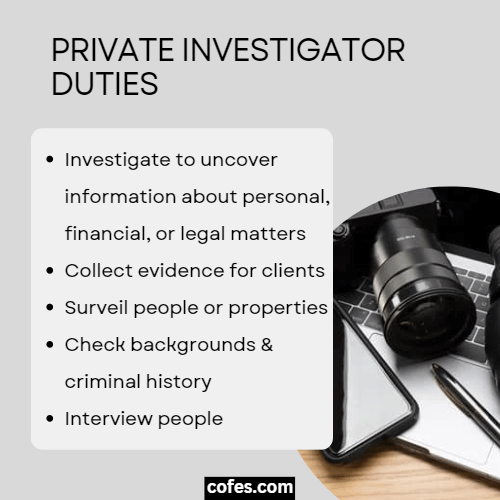The Ultimate Resource For Private Investigator Career
There are about 6000 private investigators in the US.
This number is growing at a continuous rate.
This is because the job outlook for this career path is high.
If you want to become a private investigator, you’re on the right platform.
Here is a complete career resource to help you decide whether this career is viable.
Private Investigator Job Information
| Official Job Title | Private Investigator |
| Average Salary | $56,647 |
| Stress Level | Average |
| Work/Life | Low |
| Job Satisfaction | High |
| Career Advancement | Average |
Job Description
Here is all the information you need about the work of private investigators:
What Is A Private Investigator?
A private investigator is responsible for gathering information for different clients.
Their cases may be related to personal, financial, or legal matters.
That is why their daily tasks vary significantly.
However, investigating stuff is their primary purpose.
What Does A Private Investigator Do On A Daily Basis?
Private investigators work on different cases frequently.
However, a standard part of their job is to conduct research.
Hence, they gather information for their clients daily.
They spend most of their day on the computer to gather sufficient data.
Additionally, they have to talk on phone calls daily.
After all, they must confirm the accuracy of the information.
Besides that, they also have to meet clients to give them updates.
Depending on the case, a PI may spend most of their day doing surveillance.
Moreover, they may also have to interview various individuals.
Of course, they also have to be discreet while researching sensitive cases.

Responsibilities, Duties, & Roles Of A Private Investigator
The responsibilities of private investigators vary depending on the case.
Typically they have to conduct research while following the various laws.
In addition, they must run background checks for the investigation.
Besides that, private investigators also have to testify at court trials.
Additionally, they have to handle the paperwork for clients as well.
Other responsibilities include meeting with law enforcement officials weekly or monthly.
Private Investigator Salary
Here is how much private investigators earn in the US according to their career status:
Average Salary
The average salary of private investigators per annum is $56,647.
This figure varies depending on the employer.
Besides that, other variables such as location and experience also affect the wage.
Private investigators work by self-employment, so they have a flexible salary.
However, some work for private companies and firms for a fixed amount.
In the US, most PI work in Texas and New York.
Starting Salary
Entry-level private investigators earn $49,571 every year.
As they gain more experience, their position rise.
Senior Salary
The yearly salary for senior-level PI positions is $73,771.
How To Become A Private Investigator
If you want to become a private investigator, you’re in the right place.
Here is what you need to know about it:
The Entry Level: Certification, Training & Degree
A degree is not necessary to start a private investigator career.
The essential education requirement is to have a high school diploma.
Moreover, employers prefer experience over education.
However, a bachelor’s or associate degree may be necessary for some high-end companies.
Besides that, you must have a legal license.
Otherwise, you cannot work as a PI legally.
Certifications are unnecessary for this field, but you must complete on-the-job training.
Some employers even offer formal training before assigning cases.
Other Skill Sets, Requirements & Qualifications
Private investigators need to have a set of hard and soft skills.
They have to be able to think quickly.
Additionally, they should know how to use computers.
After all, they are an integral tool for research.
Besides that, private investigators must have patience for surveillance.
Effective communication skills are also necessary for this field.
Lastly, employers prefer individuals with experience in investigative work.
How Long Does It Take To Become A Private Investigator?
If you have a high school diploma, you can immediately look for a PI job.
However, if you opt for a degree, it will take a few years.
Is It Hard To Become A Private Investigator?
The only tricky part of this career is obtaining a license.
If your background is clean, getting a license and becoming a PI will be a breeze.
Career Paths
Are you wondering if this career path is best for you?
If so, here are some details that will help you decide:
The Private Investigator Roadmap
There are three ways to start your career as a private investigator.
First, you can achieve a high school diploma.
After that, you can work part-time for different agencies.
This is necessary for gaining field experience for licensing.
Secondly, you can opt for an associate degree.
This will take two years to complete.
You can work internships while obtaining the degree.
After completing your education, you can apply for a license.
The last route involves obtaining a bachelor’s degree, which takes four years.
Once again, you should work internships or jobs during this period.
You should also note that it’s easier to get a license by achieving a degree.

Projections For Growth In Private Investigator Jobs
The job growth projection for this field is 6% through 2031, faster than most other occupations.
Besides that, career advancement for this path is average.
Most private investigators work for minor agencies.
Hence with time, they only get a raise and more significant assignments.
In Summary: Is Private Investigator A Good Career?
The daily tasks of private investigators can be repetitive.
Despite that, it is a good career if you have a knack for solving mysteries.
Working Conditions
Here are the general working conditions of private investigators:
Can A Private Investigator Work Remotely From Home?
Private investigators can work remotely if the employer has no objection.
Their work is relatively simple and does not require high-end tech equipment.
Hence, remote working is easily possible, and many employers offer it.
However, even when working remotely, they have to go out frequently.
One of the reasons behind this is to carry out interviews.
Besides that, surveillance is also not possible from the office or home.
How Many Hours Does A Private Investigator Work?
Typically, private investigators work 40 to 46 hours a week, but their hours are irregular.
Most investigators have to work on weekends and holidays too.
Can A Private Investigator Work Part-Time?
Yes, private investigators can work part-time.
However, this is not the typical case unless self-employed.
Typically, a PI has to work full-time.
Sometimes they even have to work till night.
What Are The Average Vacation Days Of A Private Investigator?
The average vacation days vary depending on the employer and career level.
Usually, a PI gets about ten days of vacation per year.
Alternative Careers & Similar Jobs to a Private Investigator
- Dispatcher
- Forensic Science Technician
- Medical Laboratory Technician
- Budget Analyst
- Data Analyst
- Business Analyst
- Branch Manager
- Financial Analyst
- Research Assistant
- Market Research Analyst
Private Investigator Resume Tips
To write a stellar resume, here are some tips that you should follow:
- Add information relevant to investigator jobs
- Avoid putting in generic skills that are not necessary for investigation
- Always add detailed bullet points to past works
- Do not add tables or fancy layouts, as they are not ATS-friendly
- Highlight any certification that may assist you during the job
Once you follow these tips, you can easily impress the employer.
Keep in mind to always mention accurate details and not exaggerate anything.
Private Investigator Interview Questions
If you are an employer, here are the critical questions to ask during the job interview:
Q1: How do you manage violent situations?
Why it works: This will allow you to learn if the applicant can fare well in violent situations.
You will also understand if they can protect themselves.
Q2: Can you share your knowledge about legal procedures?
Why it works: Private investigators don’t work with law enforcement officials.
However, they still have to conduct their research legally.
Thus, this question will let you know if the candidate can follow the law.
Q3: How do you gather and analyze information for cases?
Why it works: This will help you understand the applicant’s experience.
You will also be able to determine if their process is suitable for your firm.
Jobs Related To Private Investigator
Below are some occupations similar to this career path:
- Legal Assistant
- Fire Inspector
- Claims Investigator
- Law enforcement officer
- And much more
For HR Managers: Tips For Hiring A Private Investigator
To hire the best candidate, here are the tips you should follow as an HR manager:
Key Characteristics To Look For In A Private Investigator
Below are some characteristics that should always be present in competent private investigators:
- Ability to think quickly in stressful conditions
- Background of investigative work
- Demonstrates effective surveillance skills
- Understanding of computer tools for research
- Knows how to file paperwork in court
- No prior criminal record
Minimum Level Of Education & Experience
The minimum level of education for this field is a high school diploma.
Besides that, a few years of investigative work experience is a requirement.
Additionally, all private investigators must have a legal license.
